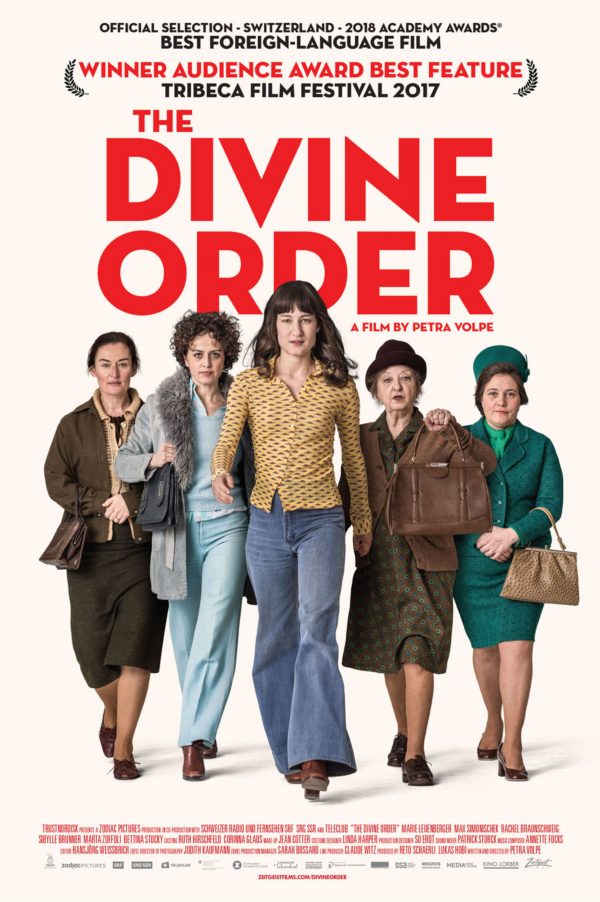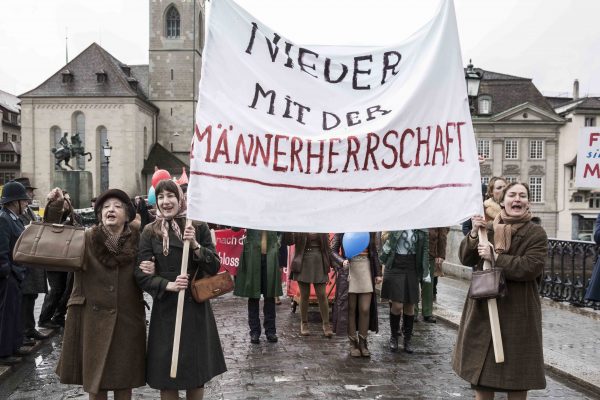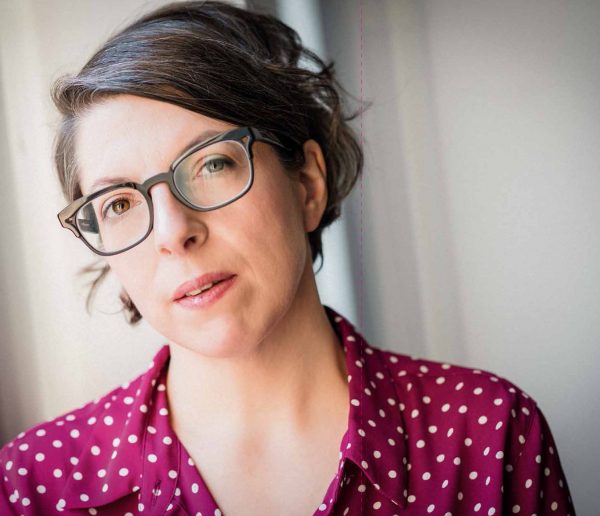The Divine Order (Die Goettichle Ordnung), written and directed by Petra Volpe, premiered at the Tribeca Film festival. It’s the Swiss entry for the Academy Awards, and it qualifies for Golden Globe consideration as a foreign-language film. Watch trailer here. You may see it on the big screen when it opens at the Royal on Friday November 17.
 In a small village in Switzerland, a conservative country where women still don’t have the right to vote in 1970, despite the changes brought by Women’s Liberation in other parts of the world, Nora (Marie Leuenberger), a young housewife and mother, cooks, cleans and washes socks for the four men in her household, her husband Hans (Max Simonischek), her father-in-law and two sons. Nora wishes to take a part time job in a travel agency, but her husband won’t let her, and the marriage law is on his side. She organizes a town hall meeting to inform the residents of the upcoming referendum on women’s suffrage. She attends a women’s demonstration in Zurich, carrying the banner “Down with male domination.” At a workshop about discovering one’s vagina by looking at its shape in a mirror, she realizes hers looks like a tiger, but she never experienced an orgasm. The village women go on strike, they congregate in the pizza restaurant of an Italian woman, Graziella (Marta Zoffoli), a character the director tells me is inspired by her father.
In a small village in Switzerland, a conservative country where women still don’t have the right to vote in 1970, despite the changes brought by Women’s Liberation in other parts of the world, Nora (Marie Leuenberger), a young housewife and mother, cooks, cleans and washes socks for the four men in her household, her husband Hans (Max Simonischek), her father-in-law and two sons. Nora wishes to take a part time job in a travel agency, but her husband won’t let her, and the marriage law is on his side. She organizes a town hall meeting to inform the residents of the upcoming referendum on women’s suffrage. She attends a women’s demonstration in Zurich, carrying the banner “Down with male domination.” At a workshop about discovering one’s vagina by looking at its shape in a mirror, she realizes hers looks like a tiger, but she never experienced an orgasm. The village women go on strike, they congregate in the pizza restaurant of an Italian woman, Graziella (Marta Zoffoli), a character the director tells me is inspired by her father.

Petra Volpe, whose middle name is Biondina in honor of her paternal grandmother, has dual citizenship, since her father emigrated to Switzerland from a tiny village in the Abruzzi region of Italy, and married a German-Swiss woman. Growing up in a small town from a working class family, Petra never thought she could be a filmmaker, but eventually she studied at the Konrad Wolf Film Academy in Postdam Babelberg, graduating in 2003. She was inspired by Italian Neorealist directors Roberto Rossellini and Vittorio DeSica, also by Federico Fellini. She considers “a great honor” to have won the Nora Ephron prize for screenwriting at the Tribeca Film festival, “to be connected or affiliated with her name, because I love her as a writer of screenplays and of short stories. She is such a great personality.”

Petra was born in 1970, so it’s her mother’s generation she references in the movie, “She was a young housewife and a mother at 21, but she didn’t go on a political journey, like Nora. I had to do a lot of research, because we don’t learn about the history of the Women’s Movement in school. Everybody knows that women did not get the right to vote in Switzerland until February 1971, but this shameful chapter was swept under the rug, let’s forget about it. But I felt that we should talk about it, because it’s an interesting aspect of our history, and it also connects to today, because the question of equality has not been solved yet. It’s a scandal. In fact, in one particular canton of Switzerland, women didn’t get the right to vote until 1990. They had actually to be forced into it, when this woman sued the federal government, saying it was against human rights.” The movie title is taken from a propaganda slogan of the anti-suffragette movement in Switzerland: “Women in politics is against the divine order”.
I identify with the life story of Petra and the topic of her movie. In early 1970, after graduating from Bologna university with a thesis about Alain Robbe-Grillet, the French novelist and filmmaker, I moved from my hometown of Modena to Rome, the cosmopolitan capital city of Italy and the center of cinema production, in pursuit of my dream to work in films. I ended up becoming a photo-journalist not a filmmaker, but I do write about movies, interviewing actors and directors about their artistic work.
In Rome I soon joined the first feminist group that was just being formed in 1970, it was called Rivolta Femminile (Female Revolt). Our numbers quickly became so large, as more and more women joined us, that we split up from general meetings to smaller consciousness-raising groups. In 1971 we organized a photo exhibit in Piazza Navona to denounce the exploitation of naked women’s bodies on magazine covers and to sell products in advertisements.
For links to the history of the Women Suffrage movement in England and the US, also second and third wave feminism, see my 2015 article Suffragette-The Early Feminists.
